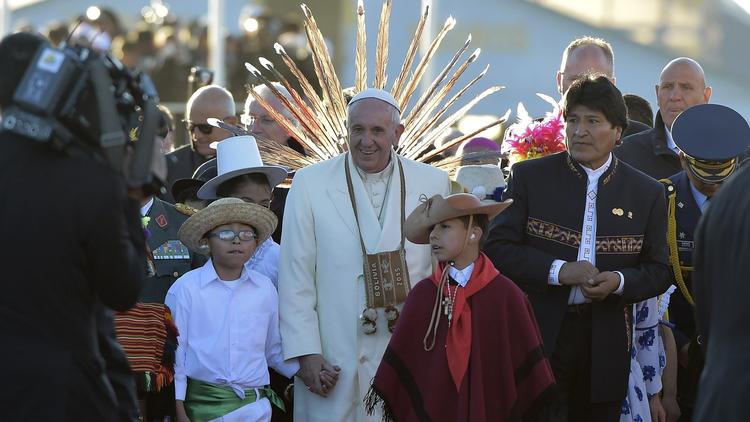
Speaking about the poor among the poor, Pope Francis on July 9 urged hundreds of thousands of worshipers gathered in the Bolivian lowlands to avoid a culture that would "discard" those people deemed less productive.
And speaking later to a group of indigenous people and peasants, he made a remarkable demand for structural economic change and added an apology for the colonial-era atrocities committed “in the name of God.”

“I wish to be clear, as was St. John Paul II,” the pope said. “I humbly ask forgiveness, not only for the offenses of the Church herself, but also for crimes committed against the native peoples during the so-called conquest of America."
In the southern Bolivian city of Santa Cruz, on the fifth day of his first trip as pope to Spanish-speaking Latin America, Francis looked out at the many indigenous women with babies on their backs and compared it with the times of Jesus.
"Carrying them, you bring your lives, the future of your people," he said. But the shoulders are also "weighed down by bitter disappointments and sorrows, scarred by experiences of injustice and of justice denied."
The leader of the Roman Catholic Church — reiterating a theme that is cornerstone to both this pilgrimage and his papacy — warned that even a "despairing mind" must not succumb to a common way of thinking that would "cut bait on the weak" and discard "all those who are 'unproductive,' unsuitable or unworthy."
For this Jesuit pope, that means the elderly, the neglected, the poor and the underclass.
Later, the pope heard from many of the marginalized groups to which he might have been alluding. Those included rural priests, indigenous activists, farmers and trash scavengers.
“I wonder whether we can see that these destructive realities [exclusion and injustice] are part of a system which has become global,” he said. “Do we realize that that system has imposed the mentality of profit at any price, with no concern for social exclusion or the destruction of nature?”
Bolivia is one of the most impoverished nations in the hemisphere and is the middle stop on the pope's tour, which started with Ecuador and will end with Paraguay.
At his appearance later Thursday at the World Meeting of Popular Movements, the pope lashed out at the themes of capitalist depravity, abuse of the environment, and similar topics highlighted in his recent encyclical on the climate change.
“Time, my brothers and sisters, seems to be running out,” he said. “Today, the scientific community realizes what the poor have long told us: Harm, perhaps irreversible harm, is being done to the ecosystem.”
The pope cited an “unfettered pursuit of money [that] rules” and leads to a “subtle dictatorship.”
“Once capital becomes an idol and guides people’s decisions,” the pope said, using some of his most forceful language of this trip, “once greed for money presides over the entire socioeconomic system, it ruins society, it condemns and enslaves men and women, it destroys human fraternity, it sets people against one another and, as we clearly see, it even puts at risk our common home."
Source: latimes.com




